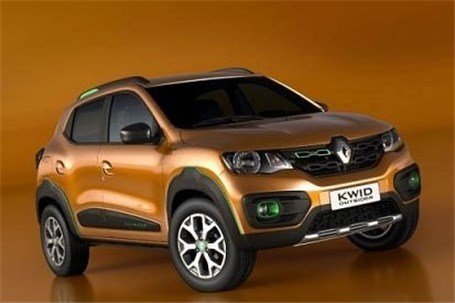
- Sunday 19 February 2017 - 14:33:00
The Renault Kwid at 3,500 euros, the keys to success
Asre Khodro - 65,000 Kwid at very low costs were sold in India over eight months. The model is undergoing industrialization in Brazil where it will be presented at the Sao Paulo show in early November. The Kwid should then come to Iran, Russia and … in Europe under the Dacia logo.
Reporting "Asre Khodro", The Kwid at very low cost? A success. Renault sold 80,000 vehicles in India in the first eight months of 2016, including 65,000 units of the small entry-level car. “We are hoping to cross the threshold of 100,000 units over the whole year,” said Sumit Sawhney, head of Renault’s operations in India. Last year, Renault sold a total of 50,000 vehicles on the Indian market. Marc Suss, director of the entry-level car program of the tricolor manufacturer, says Renault plans to produce ” 100 to 150,000 units a year ” from the Kwid in Chennai, in southeast India where the Renault Alliance -Nissan has its factory. The car is sold in the country since September 2015 from 3,500 euros. Besides its price, The Kwid is seduced by its massive bodywork “SUV” – in dimensions close to the European Renault Twingo -, its good road qualities, its modernity and its “high tech” equipment like GPS optional. The unprecedented 800 centimeter-cubic engine is also deemed sober. Unlike its rivals in the Korean Hyundai or the Japanese Suzuki, the Kwid was developed on an unprecedented platform, the “CMF-A”.
Presence at the Sao Paulo Show
This vehicle, however, has suffered recently from a counter-advertisement that it would have happened. Because the Kwid does not offer great protection in case of shock! ” The results surprised and disappointed Global NCAP ” indicates a communiqué dated September 19 of the organization that organizes the crash tests. ” After poor results earlier in the year, and following the latest improvements made by Renault (…), the vehicle still offers a single star (out of a maximum of five) for the protection of adults, ” said the organization. Not brilliant, even if security is not the primary concern of Indians, far from it!
The Kwid will soon begin outside of India. The Chennai plant is actually starting its exports. The Indian Kwid will soon be sold in South Africa. And that’s not all. Renault also manufactures the vehicle in its Brazilian plant in Curitiba. The South American version, which is safer (body reinforcements, four airbags) and more expensive to meet tougher standards, will be one of the attractions of the Sao Paulo show, which will be held from 10 to 20 November 2016. The car will be economically very attractive in the key niche of the “Carro popular”, a category fiscally favored in Brazil. Equipped with a 1,000 cubic centimeter engine, this Brazilian Kwid is expected to be produced around 100,000 annual units, according to Olivier Murguet,
Soon produced in Tangier?
And it’s not over. Renault’s projects also include industrialization in Iran and Russia in various forms. Extended versions with more classic four-door bodywork and 4×4 derivatives are envisaged. A concept of a barbed version, called Climber, was presented at the last Delhi show at the beginning of the year. By adapting it to European standards, the Kwid should also come within two years … in Western Europe, under the logo of the Romanian brand Dacia. The vehicle is expected to be produced in the giant Renault factory in Tangier, Morocco, even though Renault officially maintains the mystery on it. The site has for him available capacities and a very low cost of labor, from 2 to 3 euros per hour, against 30 in France! Price envisaged: around 6. 000 euros in basic version. This European Kwid would offer a Dacia for almost 2,000 euros less than a current Logan (basic version) …
With its future derivatives , ” Kwid will be a very big contributor to the volumes of Renault’s access range ,” says Marc Suss. But Renault is not alone in the running. The ally Nissan also marketed last June its own version of this car at very low cost. Its entry-level brand Datsun launched the Redi-Go, also produced in Chennai, India, at prices ranging from 238,000 to 334,000 rupees (from 3,140 to 4,400 euros).
How has Renault managed to create a real vehicle at this rate? First condition: study it in India where the hourly wage cost is less than 10% of that of France. So, if the draft of the platform “CMF-A” was directed primarily at the Technocentre in Guyancourt in France, the local center of the Renaut-Nissan Alliance in the Chennai suburbs took charge of Physical development of the vehicle for three years. ” With an investment cost of 420 million euros for the entire program for Renault and Nissan, ” explains Gérard Detourbet, project manager. That is ” twice less than a normal project ” .
source: qtelegram.com
- Renault
مدل جدید پرفروشترین خودرو فرانسوی معرفی شد
Renault sales decline 6.7% in first half of 2019
Renault to Return to Iran: Deputy Minister
Renault to stay in Iran despite US sanctions
SAIPA Hands Over Bonro Factory to Renault
Renault breaks records with its friends!
Renault's Mueller quits, clearing CEO succession path
-
Renault Lead the Way, Nissan Climb
The Renault partnership in Russia changes the investment location in Iran
Renault management confirms three new Renault Kwid family members
Iran Has 4% Share in Renault’s Int’l Sales
Renault Exports to Iran Rises by 83%
Renault's Plan for Iran Auto Market
Achievements of Renault’s investment in Iran auto industry
Renault has reached to the top market for imported cars in Iran
SUVs Dominating Iran Car Market
Renault adds local engine plant to Iran JV agreement
Renault Sets Up New Iran Partnership Amid U.S. Trade Tensions
Groupe Renault signs a new joint venture in Iran
Renault started launching in Saveh
Iran's contract with Renault was signed
Who won signs the contract of the largest investment in the Iranian automotive industry?
Producing of 150,000 vehicles in the first phase with investments of 660 million euros
Negin Khodro ended the Korean monarchy in Iran's car market
Two French Carmakers Moving Ahead at Full Speed
The last Breathtaking Moments of the Largest Investment Contract in Iran's Automotive History
The most advanced ABS brake line in Iran is launched
The partnership agreement with Renault is in the final stages of the work
The Unending Saga of ‘Localization’ in Iran Auto Industry
PSA hires Renault-Nissan exec to lead push in Africa
Iranian Firm to Introduce New Megane
Renault-Nissan seeks Ghosn heir to drive integration
Groupe Renault senior management appointment
Renault Iran Chief Taking Over Reins at Nissan India
Revenues increase 25.2% in the first quarter
UPDATE 1-Renault revenue lifted by new models, Lada consolidation
Iran Dedicated Training Center to be Operational by the End of the Current Year
IDRO, Renault Deal in the Offing
Nissan makes two key appointments in region
Renault Imports to Iran Increase 110%
Renault Reportedly to Operate Independently
Renault-Nissan sales close to 10 million in 2016 Join our daily free Newsletter
Renault boasts record year despite diesel probe
Iran to Finalize Deal with Renault in Weeks: Minister
IDRO signs 19 MOUs with giant automakers in post-sanction era
Iran stars as Renault powers to record 2016 sales
Renault Duster May Be Obsolete
Renault Trucks, Arya Diesel Motors Sign 2 Agreements
Renault Trucks signs two agreements with Iranian importer Arya Diesel Motors
Renault’s 11-month sales to Iran up 146% yr/yr
Renault Brands in Iran Auto Show
Groupe Renault: third quarter revenue up 13 per cent
Renault Sales in Iran Up by 127% in September
Renault Kwid spotted in Iran, to be manufactured locally
Renault Looks to Grow Automotive Presence in Iran
Renault signs MoU with Iran to create new joint venture
Renault Trucks appoints new president for Greater Middle East region
Rise of Koreans!
Record Registrations for Groupe Renault in H1 2016
Renault to enter Iran’s car market with 5 new products
Renault’s Iranian market share rises 7-fold in post-sanction era
Renault eyes launching new production lines in Iran
Iranian automaker to sign contract with Renault
FCA, PSA, Renault eye deals as Iran president tours EU
Iran's President says Peugeot, Renault deals possible on Europe trip
Franco-Japanese auto giant keen on Iran expansion
Renault November sale to Iran skyrocketed
Renault-Nissan's French peace deal leaves investors underwhelmed
Renault’s one-month sales to Iran up 2.5 folds yr/yr
Renault Sandero assembly line launched in Iran
French carmakers duel over Iran
Renault Symbol unveiled in Iran
Renault never left Iran during sanctions
Controversial Vehicle Price Surge in Iran
IKCO management handed over to consortium of non-governmental shareholders
Iran's government approved car import after four years
$2 Billion Aid Package to Bolster Automotive Industry
Renault sales decline 6.7% in first half of 2019
FIAT cars will be manufactured in Salafchegan, Iran
Car, mobile price fluctuations in Iran puzzling people
IKCO, Azad University Sign R&D Agreement
When will Azerbaijan start producing Peugeot 207?
Iran Annual Auto Output Report: 2018-19
Automotive Industry has exceeded the targets with “Automechanika Istanbul” which the World's 3rd Largest Fair!
Sout Korea’s auto exports down 1.6% in Feb.
Renault to Return to Iran: Deputy Minister
Chery's luxury brand will soon be on the market
Warm start for arrizo6 in Ahwaz







